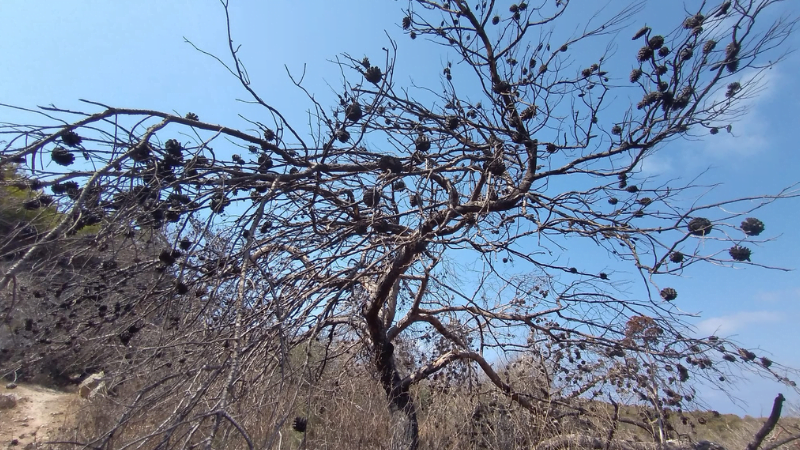As Malta swelters under soaring temperatures far above the norm, droughts are severely affecting Malta’s remaining woodlands, with environment conservation expert Alfred Baldacchino warning “immediate action needs to be taken” to safeguard areas like Miżieb.
When asked about the effects of droughts and the increasing aridity of Malta’s environment, Baldacchino said that wildfires resulting from the increased dryness will become more and more problematic in Malta’s shrinking woodland territory.
“The higher the temperature, the more probable this will be, and not just in Mizieb but also in areas like Buskett, for example. The Environment Resources Authority, the authority which is responsible for the protection of Malta’s biodiversity, should be well aware and prepared for such eventualities,” Baldacchino said, arguing in favour of 24/7 surveillance on such areas.
While it is not abnormal for woodlands to be drier than normal during the hot summer months, a recent report tabled by an international climate body warned of the dangers of abnormally high temperatures and freak weather events, including extended periods of drought.
A site visit by The Shift on 17 August revealed that while some stretches of land in Miżieb seem to have trees which are still in good health, a significant amount of dry, dead land was also observable.
During the site visit, The Shift took photographs every few hundred metres across all of Miżieb’s accessible area to obtain a rough idea of the extent of the dry patches. Click here to see the 29 photographs.
Analysis of the images shows that 30% of them exhibit areas that were still alive and well. 45% of the images show dry patches interspersed with healthy specimens, while the remaining 25% show mostly desiccated trees and shrubs.
Questions on what is being done to safeguard Malta’s woodlands from the effects of droughts accelerated by climate change have been sent both to the hunters’ federation (FKNK) and the Environment Resources Authority (ERA).
FKNK had taken over management of Miżieb and Aħrax after signing a concession agreement with the government in secret in October of last year. The government had moved the conference ahead of its schedule and had excluded the press from attending the signing, eliciting public outrage at the concession.
Neither the FKNK nor ERA have answered The Shift’s questions. It is known, however, that the agreement signed by the FKNK, does stipulate that the organisation “shall be responsible for the maintenance and upkeep of the Site and associated facilities at its own cost and expense in accordance with the Standards of a Reasonable and Prudent Guardian”.
“Even though these areas are managed by a voluntary organisation, this does not mean that such responsibility is solely in the hands of the organisation,” Baldacchino insisted, emphasizing that his criticism was leveled squarely at the authorities.
“ERA is the official authority to ensure that such contingency plans are at hand for any eventuality. Immediate action should be taken in this regard,” he added.
According to Baldacchino, the authorities should appoint specialised conservation officers with enough manpower, contacts, apparatus and water supply being made immediately available to combat the effects of droughts. He also pointed out how such high temperatures leading to wildfires is a particularly worrying issue in an area like Miżieb since it is dominated by Aleppo pine trees, which are highly flammable.
“Aleppo pine trees cannot be saved once they start burning; they do not recover, and they die,” Baldacchino explained, pointing out that some other types of trees, such as the olive tree, are able to recover even after having caught fire.
Baldacchino also spoke of the increased frequency of wildfires stimulated by droughts in neighbouring Mediterranean countries as well as other European, American and African states.
“Such disasters, which denude the land from vegetation, also take their toll on the fauna which live in such habitats. Besides the loss of biodiversity will, without doubt, also further contribute to the negative impacts of climate change. This will cause biodiversity loss which will be very difficult, expensive and time consuming to recover,” Baldacchino said.
In 2019, nearly 25% of Miżieb was lost to fire, although it remains unclear how the conflagration started.
“No green walls, commercial ‘landscaping’, importation of seeds or any other profit oriented projects can ever compensate for the loss of biodiversity and its benefits, if such wooded landscapes succumb to fires,” he added.
Overall, Miżieb’s planning issues extend beyond the abundance of Aleppo pine trees in the area. Baldacchino also believes that the fact that most of the species which live in Miżieb to this day were imported further contributes to their vulnerability in high temperatures.
Imported trees generally have a much harder time at settling in the local climate since they would have likely been grown in favourable conditions such as in a greenhouse, making them less capable at surviving in less ideal conditions. To combat the droughts, Baldacchino suggested regular, specialised irrigation in the area to keep the woodlands alive as temperatures increase.
“In the dangerous months of summer, the areas cannot be managed in the same way they are managed during the winter, they need more attention and resources,” he added.













